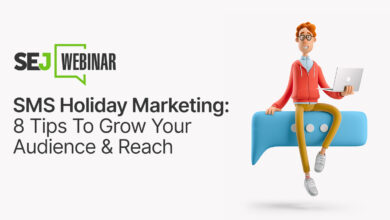SEO Strategy For Recurring Events, Seasonal Sales & Pop-Up Stores

Repeating events and seasonal stores can provide great opportunities to boost business performance and create meaningful interaction with a broader repeat audience.
From small local fairs and pop-up stores to mega music festivals and industry-leading shows, the opportunity to immerse yourself in these organic seasonal marketing campaigns should not be overlooked.
Some great articles have been written about optimizing the Google Events package and carousel search with Schema, so I won’t be re-covering those here.
And if you’re looking for a seasonal marketing calendar for fresh inspiration, here’s a handy marketing calendar for 2022.
This post will help you shape your SEO strategy to maximize recurring seasonal events such as Black Friday, Christmas and Cyber Monday, applicable to online businesses and offline pop-up stores.
This will also help event-oriented brands of all sizes effectively optimize for frequent industry fairs, festivals, and other forms of attendance-based SEO campaigns, regardless of how localized they are.
Serving the consumer’s intent accurately
Essentially, you need to be visible in the conversation for every dominant intent area surrounding your event within the major search engines.
There are many ways to collect data on the objective information that people associate with your event.
You should also explore data on larger, more established competitors who may be better known from your event but who closely match your particular situation.
The easiest data point is right in your Google search results and predictive search.
The example below shows the prevailing expectations from Google based on a wide range of historical search data.
This cuts out a lot of the raw data work and points you in the direction of the main sub-topics you’ll need to cover comprehensively by organizing valuable content.
Consider the above as seed keyword topics or topics from which to expand into content briefs, with the goal of developing a number of content-rich landing destinations to grow your SEO success.
Target organic visibility in the SERP
The greatest opportunity to get your brand, seasonal event, or pop-up shop exposed to new and existing audiences is through targeted click-through and rich results in Google Search Engine Results Pages (SERPs).
Staying with this same Glastonbury Festival example, you can identify and prioritize rich results and mixed search results to target with your SEO strategy.
Initially, four main areas stand out.
First, the “people also ask” part. This appears directly under the first result in the SERPs in this scenario.
This is often an opportunity for multiple branding opportunities to appear on the front page or for coverage you may have that is placed on closely related external sites.
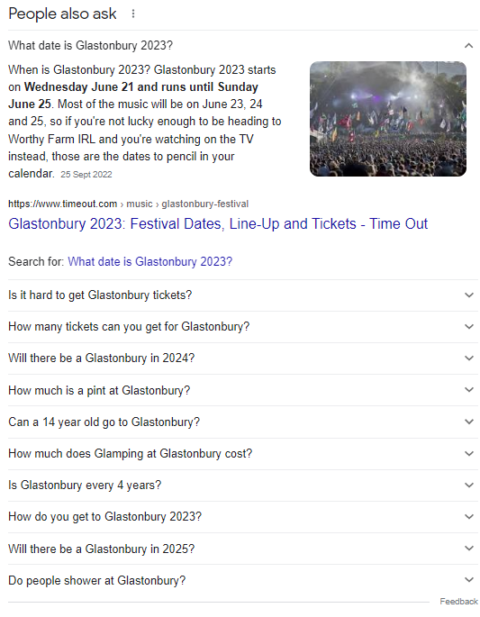 Screenshot of search [glastonbury 2023]October 2022
Screenshot of search [glastonbury 2023]October 2022You’ll frequently see industry-specific media sites occupying this space along with deeper forms of content such as directories and white papers.
The bottom line is that these are non-competing sites where you have a real reason to place content directly on their sites and be present in more than one of the highest positions at Google.
Next is the video section, it is often used for event related and recurring query types for seasonal purpose search.
To help rank video content, traditional video optimization methods are applied.
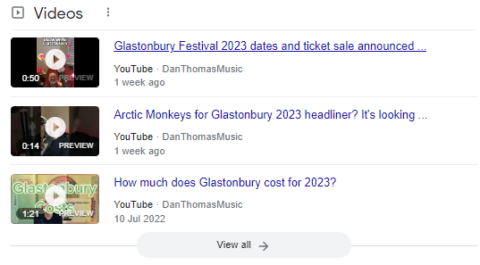 Screenshot of search [glastonbury 2023]October 2022
Screenshot of search [glastonbury 2023]October 2022Other leading SERP results to target, in this case, are images:
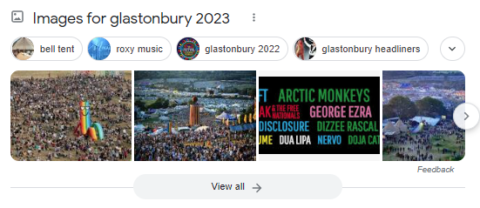 Screenshot of search [glastonbury 2023]October 2022
Screenshot of search [glastonbury 2023]October 2022And the “related searches” results that appear at the bottom of the page:
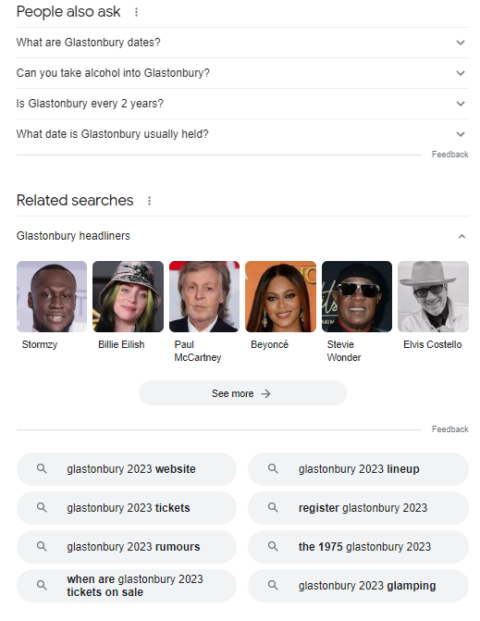 Screenshot of search [glastonbury 2023]October 2022
Screenshot of search [glastonbury 2023]October 2022Completeness of one page coverage is the key factor to be present in these rich results, in addition to the type of content pre-ordered and technical optimization through the scheme.
As a tip, always look at who is currently filling these spaces in the SERP and think about where the topical gaps are in the external content and what signals you could improve (social media, backlink value, authorship, trustworthiness, credibility, quality of various types of content, etc.)
Master the local landscape
Local SEO is a common thread in all recurring events and seasonal or pop-up store SEO strategies.
The local area is the operator through which all mobile searches are filtered.
Local Intentions has also grown faster over the past two or three years.
In fact, search indicators associated with the intent of the site, including “shopping near me”, appeared. Significant growth dating back to 2017:
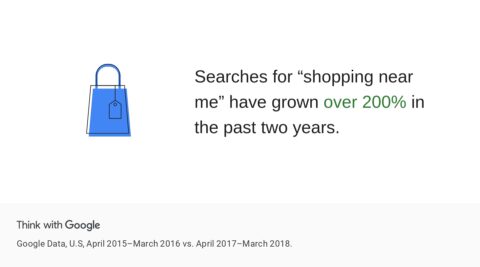 Screenshot from Think With Google, October 2022
Screenshot from Think With Google, October 2022There are many practical approaches to optimizing your website for local SEO, and some of the most effective are:
- Actively participate in local forums and business events.
- Promote content, public relations, and other brand mentions through local media sites.
- Flatten experts to boost your authority on the local and broader levels.
- Create content-rich local landing pages.
- Build backlinks to relevant business, entities and industry.
- Proactive management of social media channels, including local social listening.
- Maximize your business profile(s) in Google and Bing Places.
A permanent approach to seasonal marketing
Just because you’re targeting a Christmas event, or a fair in September, doesn’t mean you have to look at the previous month’s SEO.
to me Recent consumer insights from Google:
“…40% of US holiday shoppers say their holiday shopping experience made them consider shopping much earlier to hit other milestones this year.”
Google goes further in the same article to say:
“As of June 2021, 31% of American shoppers had already started holiday shopping, and 37% of shoppers who shopped this past holiday season wished they had started earlier.”
So what does this mean for your SEO strategy for seasonal repeat marketing and pop-up stores?
The direct impact of this behavioral change is that you need a permanent component to your seasonal SEO.
This provides an opportunity to grow authority on the topic year after year.
This means that you can stay actively visible on key, immutable themes (“music festival,” “local pop-up shop,” “Christmas baskets,” etc.) to make the most of your early purchase intent.
You can also mark the events of previous years by having annual landing pages that keep adding value to the site and support next year’s earnings. would be eg Glastonbury 2022.
This also offers a way to target future intent.
Staying with the same example above, we can look forward to Glastonbury 2023 (and still ahead).
You might be surprised that people plan more than two years ahead with larger seasonal events. Here is an existing rich result ready to be optimized for Google:
 Screenshot of search [glastonbury 2023]October 2022
Screenshot of search [glastonbury 2023]October 2022Being the first to identify and act on this type of user intent in the future opens up the opportunity to get number one and be the company that dominates these key insights.
Final quick tips for seasonal marketing
Many important strategic elements fall into the realm of seasonal and event-based marketing for SEO.
Here are some additional tips to aid your marketing efforts:
- Make the most of urgency. As events approach, people need to take quick action. Make this process as quick and simple as possible; Give people everything they need in one place. This will vary from ecommerce store to brochure site, but the goal remains the same.
- be the most convenient choice. If you’re a local pop-up shop, immerse yourself in the local community and serve people’s pain points. Think about what you can offer that a larger or non-local company can’t. For example, free local delivery or temporary same-day service.
- Keep things simple. If you are only open two days a week or during certain seasonal dates, provide advance booking, 24/7 online support, and related customer service. This will help fill reservations and orders in advance and maintain positive vibes for future repeat business.
More resources:
- Seasonal SEO tips and examples for year-round search improvements
- How to use paid search and social advertising to promote events
- Ecommerce Marketing: The Ultimate Guide
Featured image: Rohappy/Shutterstock



